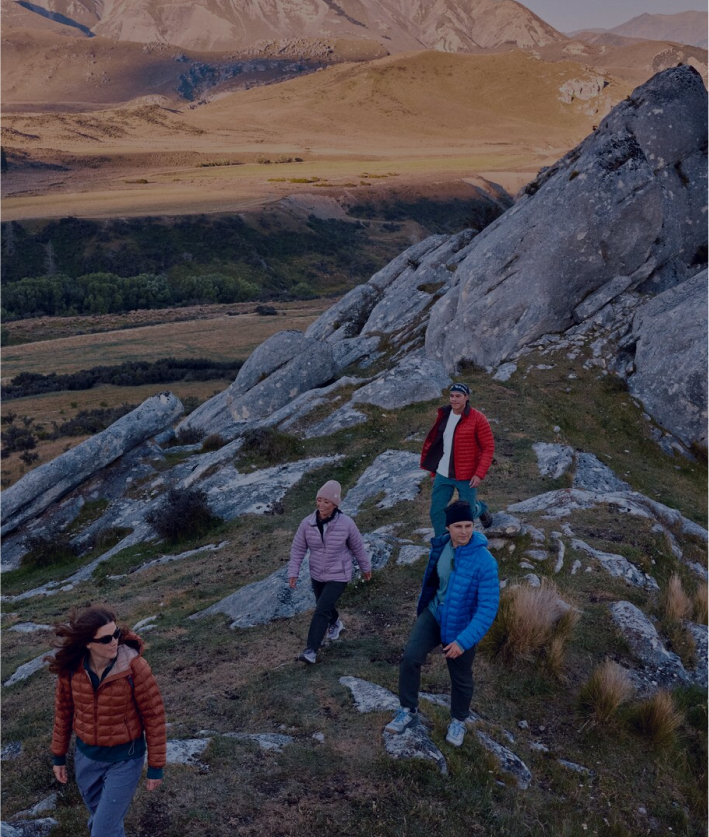Use your next camping adventure as an opportunity to lower your impact on nature. Check out our responsible tips below so you can plan beforehand and visit your favourite camping spots with a fresh perspective.
1. EXPLORE YOUR OWN BACKYARD FIRST
Choose a camping spot closer to home. Cars are responsible for a large percentage of our greenhouse gas emissions, so a close campsite will help reduce your carbon footprint. If you're not sure where to look, check your national park authority online. Think outside the box and even search for land-sharing sites that allow you to camp on private land.
2. GET SUPPLIES FROM A LOCAL MARKET
Packaging is a curse when it comes to camping (or hiking). Avoid supermarkets and rectify the problem at the source – by buying produce from local farmers' markets. Even try stocking up on fruit and veg at home and prepare some family meals that will last the distance. Besides being more environmentally friendly, less packaging means less rubbish for you to deal with later on.
3. INVEST IN REUSABLE ITEMS
Plastic plates and utensils can be hard to recycle. In fact, most of those forks and spoons are too small to be collected in a recycling sorting machine. Instead:
- Bring crockery and utensils from home
- Opt for tupperware containers – rather of plastic wrap and foil
- Buy reusable drink dispensers and fill up at home – to avoid buying plastic bottled water
If weight’s a consideration, look for collapsible bowls and mugs and all-in-one cutlery. Investigate reusable beeswax wraps and snack packs. You can even experiment with dehydrating your own food.
4. SORT OUT SOME WASTE STATIONS
At a minimum, you should have two bins. One for landfill, the other for recycling, and ideally an extra one for food scraps. If you're camping with kids or a large group, it's a great idea to make a point of difference between the two. For example, place your recyclables in a box, and anything for landfill in a bag. This avoids cross-contamination and makes it easier to empty into your bins at home. Don't forget to place food scraps out of reach from any native wildlife!
5. TAKE ABSOLUTELY EVERYTHING WITH YOU
Even if there’s rubbish bins at your campsite, it’s an excellent habit to take your rubbish home. Animals can get into the bins and make a mess, but they can also become reliant on the bins as a food source. If you want to be a real champion, pick up any rubbish that others have left behind.
6. USE BIODEGRADABLE SOAP
Normal dish detergent can harm the environment so it's best to bring biodegradable, eco-friendly camping soap. An all-in-one unscented castile soap will wash your hair, body, clothes and dishes, so it’s a super option to keep things simple.
PRODUCTS: A0783/,A1148/,61466/,Enjoy your camping swims, but don't shampoo or rinse your soapy dishes in any water source. Detergents, sunscreens, and soap can all cause significant harm to river ecosystems over time. A better option is to use a portable camping shower, or a bucket so you can wash away from any water sources.
8. BE RESPONSIBLE WITH CAMPFIRES
Campfires are an essential part of the experience for some. To keep it as green as it can be:
- Don't make your fire bigger than you need it
- Limit the amount of kindling you forage from the local area
- Don't burn anything that isn't wood in the fire – other than the occasional marshmallow
- Extinguish your ashes properly before leave it
Always check for warning and fire restrictions in your area before you head off. Never light a fire when restrictions are in place.
9. HARNESS THE POWER OF SOLAR
Leave your noisy generator at home and opt for solar accessories for the bare necessities. A head torch is a must when you're camping, but a solar-charged lantern is a good bet for shared spaces or your tent. It's never a bad idea to have a fully-charged mobile phone in case of emergencies. If you're camping for a few days or more, consider taking a Goal Zero Nomad to recharge your devices.
10. BRING A TROWEL AND DIG A HOLE
These days many campsites have amenities including compostable toilets. But if you find yourself in the middle of nowhere when nature calls, you'll need these three things:
- Toilet paper
- A paper bag
- A trowel
Dig a cat hole with the trowel, do what you need to do, and cover it up so it breaks down as quickly as possible. Place your toilet paper in the paper bag for disposal later on. While some people bury theirs, it’s best practice to take it with you to truly leave no trace.
11. STAY ON THE TRAIL
National parks are dedicated to the preservation of some of our most precious ecosystems. We're lucky to have camping sites surrounded by incredible scenery, and trails that allow us to experience nature in all its glory. But when you stray off the trail, you risk crushing plants, disrupting the local wildlife and contributing to soil erosion in the area. Keep yourself and the environment safe by sticking to the path.
12. LEAVE WHAT YOU FIND
This is an easy one. Leave the surrounding area as pristine as possible, and don't bring any keepsakes home with you like stones, sticks and plant life.













